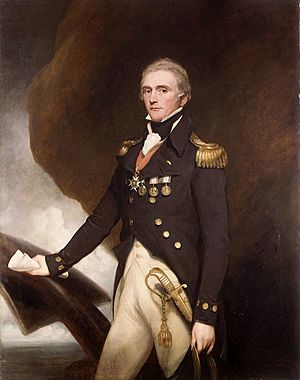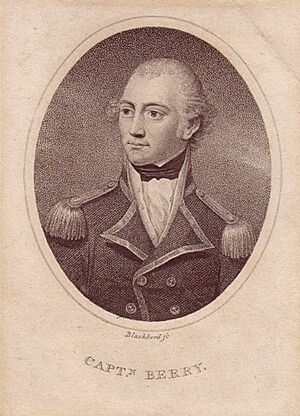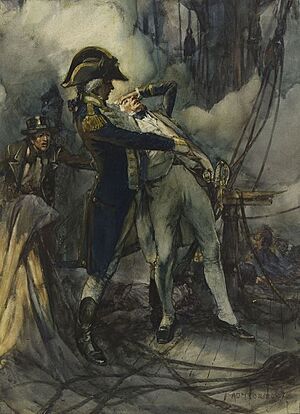Edward Berry facts for kids
Quick facts for kids
Sir Edward Berry
|
|
|---|---|

Rear-Admiral of the White Sir Edward Berry, 1st Baronet
|
|
| Born | 17 April 1768 London, England |
| Died | 13 February 1831 (aged 62) Bath, England |
| Allegiance | United Kingdom of Great Britain and Ireland |
| Service/ |
Royal Navy |
| Rank | Rear Admiral of the Red |
| Battles/wars | Battle of the Nile Battle of Trafalgar Battle of San Domingo |
| Awards | Knight Bachelor (1798) Baronet (1806) Knight Commander of the Order of the Bath (1815) Small Naval Gold Medals for: the Nile (1798) Trafalgar (1805) San Domingo (1806) |
| Relations | Louisa Forster (wife) |
Rear Admiral Sir Edward Berry, 1st Baronet (born April 17, 1768 – died February 13, 1831) was a brave officer in Britain's Royal Navy. He is best known for being the captain of Rear Admiral Horatio Nelson's ship, HMS Vanguard, during the famous Battle of the Nile. This battle happened before he became a knight in 1798.
Sir Edward Berry had a long and impressive career in the navy. He also commanded HMS Agamemnon at the Battle of Trafalgar, another very important naval battle.
Contents
Edward Berry was born in 1768 in London. His father, a merchant, passed away when Edward was young. This left his family, including his mother, five sisters, and two brothers, in a tough financial spot.
His uncle, Reverend Titus Berry, helped with his early education in Norwich. Thanks to one of his uncle's old students, Lord Mulgrave, Edward joined the Navy. He became a volunteer aboard the Burford in 1779, when he was just 10 years old.
Service in the French Revolutionary Wars
Edward Berry showed great bravery when he boarded a French ship. Because of this, he was promoted to Lieutenant on January 20, 1794. In May 1796, he joined HMS Agamemnon with Captain Nelson. He then followed Nelson to HMS Captain in June.
Nelson quickly saw how talented Berry was. He wrote to Admiral Sir John Jervis, saying he was very happy with Berry as both a gentleman and an officer. Admiral Jervis agreed, calling Berry an officer with "great courage and laudable ambition." Berry even commanded the ship well when Nelson was away during a siege. For his excellent work, he became a Commander on November 12, 1796.
While waiting for his next assignment, Berry stayed on HMS Captain during the Battle of Cape St Vincent in February 1797. Even though he didn't have a specific job during the battle, he showed his courage again. When Nelson decided to board the Spanish ship San Nicholas, Berry was the first to jump onto the enemy ship. Nelson later wrote that he found Captain Berry already in control of the ship's deck.
In October of the same year, Nelson was made a Knight of the Bath. Berry was with him for the ceremony. When the King noticed Nelson had lost his right arm, Nelson cleverly pointed to Berry and said, "But not my right hand, your majesty." They agreed that Berry would be Nelson's main captain when Nelson next took command of a fleet.
In late 1797, Nelson wrote to Berry about French plans to take over Egypt. He advised Berry to marry quickly if he planned to, because he would soon be very busy. On December 12, Berry married his cousin, Louisa Forster. A week later, he was appointed as the main captain of HMS Vanguard.
The Battle of the Nile
On August 1, 1798, the big battle happened at Aboukir Bay, known as the Battle of the Nile. During the fight, Nelson was hit on the head and fell, bleeding. Captain Berry caught him, and Nelson said, "I am killed. Remember me to my wife." Luckily, his wound was not serious, and he only had a mild concussion. He was well enough that evening to see the huge French battleship L'Orient explode.
Only 4 out of 17 major French ships escaped being destroyed or captured. The French lost six times more sailors than the British, making it a huge victory for Britain.
After the battle, Thomas Hardy became the captain of HMS Vanguard. Berry then sailed for Britain on HMS Leander, carrying Nelson's important messages. However, during the trip, the Leander was attacked and captured by one of the French ships that escaped the Nile, the 74-gun Généreux. Berry was badly wounded when a piece of another man's skull hit his arm. It was a very brave and bloody fight.
Because he was captured, Berry didn't reach England until December. By then, news of the Battle of the Nile had already arrived. He wrote that when he returned to Norwich, people were overjoyed to see him. Berry's story of the battle was published in newspapers and became a popular booklet. People in Britain loved collecting items related to the Nile victory, like ceramic jugs with pictures of Nelson and Berry, calling them "Heroes of the Nile." On December 12, he was made a knight and given the Freedom of the City of London.
In the spring of 1799, Berry was given command of HMS Foudroyant. He was sent to help block off Malta. There, he helped capture Guillaume Tell and Généreux. These were the two French ships that had escaped the Battle of the Nile, and Généreux was the ship that had captured him earlier!
Berry wrote to Nelson, saying he wished Nelson had been there to share the glory. This shows how much Berry looked up to Nelson. While Berry was very brave, he was sometimes known for being a bit reckless. Thomas Hardy, not Berry, became Nelson's closest and most important helper.
In June, the Foudroyant carried the Queen of Naples from Palermo to Livorno. Soon after, Berry returned to England.
It took five years before Berry got another important command. He felt frustrated and ignored by the Navy leaders. Nelson tried to cheer him up, saying it was annoying to be without a job but useless to worry about it.
Finally, a change in leadership at the Navy gave Berry a new chance. Nelson hoped Berry would get a ship now.
Berry's chance came in 1805 when he arrived at Trafalgar as captain of HMS Agamemnon. Nelson famously joked, "Here comes that fool Berry! Now we shall have a battle." Berry had a reputation as a fighter, even if he wasn't known as a master planner. One captain even found it amusing to see Berry's Agamemnon firing at everyone around!
It was lucky for Berry that after waiting so long for a ship, he got the Agamemnon just before Nelson's greatest battle. The Agamemnon didn't have any special moments at Trafalgar and didn't suffer many losses. It fought against the Santissima Trinidad and other French ships near the end of the battle. After the battle, Berry went to Nelson's ship, the Victory, to speak with him. But by the time he arrived, Nelson had just died. This bad timing was something Berry regretted for the rest of his life.
In 1806, Captain Berry and the Agamemnon fought bravely at the Battle of San Domingo. He was highly praised for his actions there. That same year, he became a baronet. He continued to serve at sea throughout the war, commanding Sceptre in 1811, Barfleur in 1812, and even one of the Royal Yachts.
Later Career and Final Years
In 1814, Sir Edward Berry bought a house in Norwich. On January 2, 1815, he was made a Knight Commander of the Order of the Bath. On July 19, 1821, he became a rear admiral.
Even though he asked the Admiralty many times, he never received another important command during these years. However, his record was still amazing. He was one of only three Royal Navy officers, along with Nelson and Collingwood, to receive three Naval Gold Medals. He earned these for commanding a ship in the Battle of the Nile, Trafalgar, and San Domingo.
After several years of serious illness, Sir Edward Berry passed away on February 13, 1831, at his home in Bath. He was buried in a nearby churchyard at St Swithin’s Church, Walcot, Bath. Since he had no children, his title of baronet ended with his death.
Images for kids
 | Audre Lorde |
 | John Berry Meachum |
 | Ferdinand Lee Barnett |




